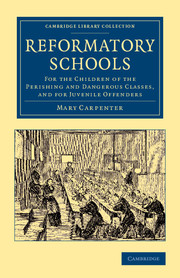
-
Select format
-
- Publisher:
- Cambridge University Press
- Publication date:
- October 2014
- October 2013
- ISBN:
- 9781139854672
- 9781108062299
- Dimensions:
- Weight & Pages:
- Dimensions:
- (216 x 140 mm)
- Weight & Pages:
- 0.47kg, 370 Pages
You may already have access via personal or institutional login
Book description
Daughter of a Unitarian minister and schoolmaster, the penal reformer and educationist Mary Carpenter (1807–77) grew up in a pious family with a strong sense of obligation to those who were less fortunate. Moved by the appalling circumstances of destitute children in Bristol, she established her first ragged school in 1846. In her bid to improve the difficult lives of juvenile delinquents, her enlightened philosophy was one of rehabilitation rather than retribution, emphasising the importance of giving children a sense of self-worth. These views form the basis of this landmark work, first published in 1851. Marshalling a range of evidence in support of her argument, Carpenter highlights the need for radical change in the treatment of young offenders. Her lobbying bore fruit in England with the passage of the Youthful Offenders Act (1854), described as 'the Magna Carta of the neglected child'.
Contents
Metrics
Altmetric attention score
Full text views
Full text views help Loading metrics...
Loading metrics...
* Views captured on Cambridge Core between #date#. This data will be updated every 24 hours.
Usage data cannot currently be displayed.
Accessibility standard: Unknown
Why this information is here
This section outlines the accessibility features of this content - including support for screen readers, full keyboard navigation and high-contrast display options. This may not be relevant for you.
Accessibility Information
Accessibility compliance for the PDF of this book is currently unknown and may be updated in the future.


